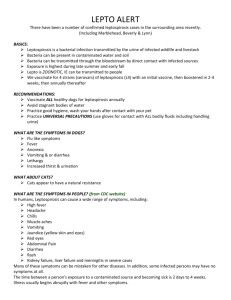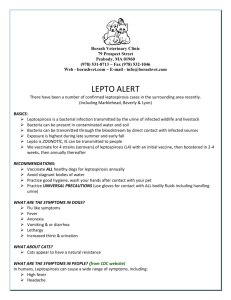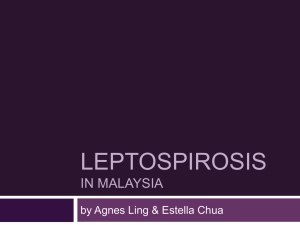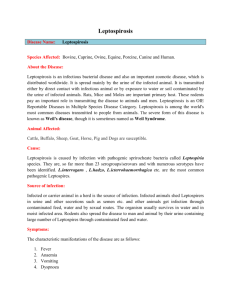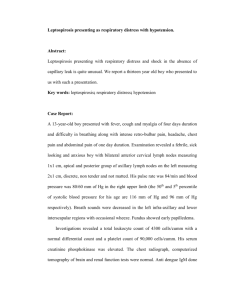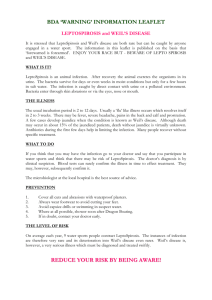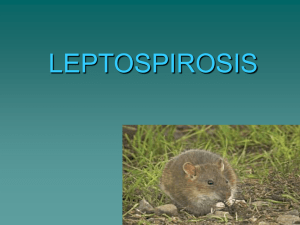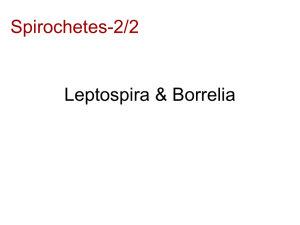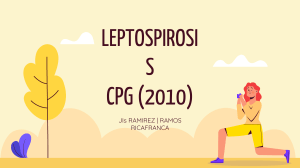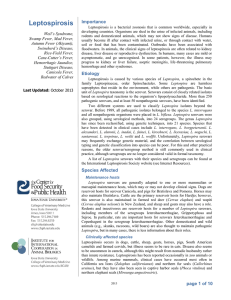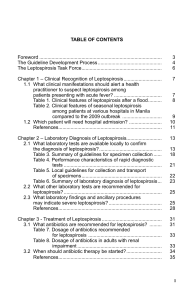Leptospirosis in Nicaragua
advertisement
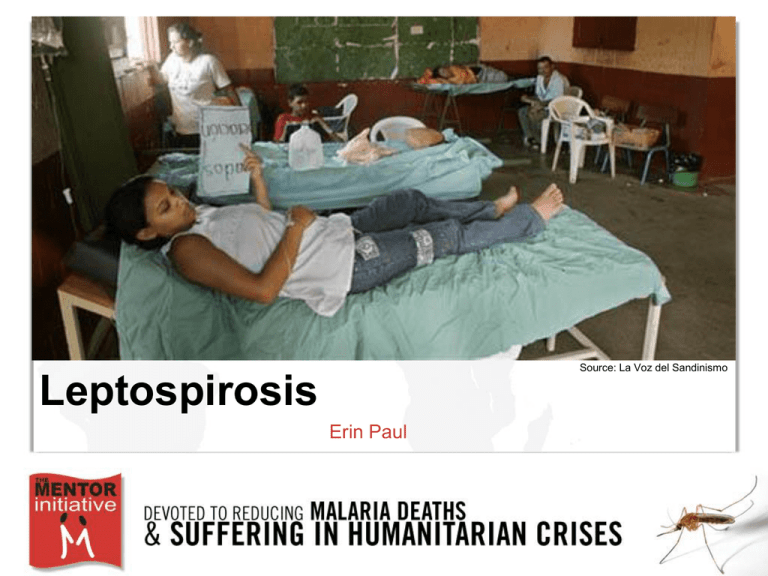
Source: La Voz del Sandinismo Leptospirosis Erin Paul Objectives • Analyze an epidemic in Nicaragua for lessons about dealing with leptospirosis in emergencies and humanitarian crises. • Describe the most common symptoms of the infection • Describe diagnosis techniques and treatment • Name public health interventions to prevent transmission Recent Outbreaks in Nicaragua (1995, 2007, 2010) • Three original patients with pulmonary hemorrhaging died. • Doctors at the local Health Center thought it was dengue hemorrhagic fever. • Other patients with high fever, muscle aches, headache, vomiting, and diarrhea • During hurricane season after particularly heavy rains Flooding before 2007 outbreak Source: La Prensa Leptospirosis • Zoonotic disease passed from many kinds of wild and domestic animals • Caused by a type of bacteria called a spirochete (leptospira interrogans) Source: Dr. Scott Smith History of the disease • Severe form of leptospirosis studied by Adolf Weil • Bacteria identified by Stimson • Some evidence that incidence is increasing Photo of Adolf Weil. Source: Wikipedia Creative Commons Epidemiology Source: cabi.org Transmission Symptoms • Many cases are relatively mild • Fever, muscle and bone pain, headache • Conjunctival suffusion indicates leptospirosis • Severe form also known as Weil’s disease • Pulmonary problems are not common • Renal and liver failure in severe cases Differential Diagnosis • • • • • • • Dengue Malaria Rickettsial disease (spotted fever) Scrub typhus Typhoid fever Hantavirus Influenza Diagnosis • Diagnosis via ELISA or MAT tests • Dipstick test – Leptospira found in blood for 7 – 10 days – Then leptospira move to the kidneys and can be found in urine Source: Clpmag.com Treatment – Hospitalized patients • Penicillin is the antibiotic of choice – 6 million units per day – Alternatives include doxycycline, ceftriaxone, cefotaxime. • For children <8 years – Azithromycin – Clarithromycin • Supportive care for dehydration, hypotension, hemorrhage, etc. Treatment -- Outpatients • For outpatients (who can tolerate oral medications): • Doxycycline 100 mg twice daily orally, for 10 days – Not for children under 8 or pregnant women – Amoxicillin 25 – 50 mg/kg divided in three doses for children/pregnant women • For patients allergic to penicillin: – Erythromycin 250 mg, 4 times a day for 5 days Treatment • Give doxycycline to people at a high risk for a short period of time • Tetracycline is no longer recommended – Contraindicated with renal insufficiency – Renal insufficiency common in severe leptospirosis • Treat with doxycycline if rickettsial diseases are also endemic Prevention • Public health measures – Vector control (rodent control) – Improved sanitation • Storm water drainage in urban areas • Garbage management – Disinfection of potable water supplies • Education for high risk occupations – Sewer workers, butchers, etc. • Avoid contact with flood waters and don’t swim in areas that may be contaminated Relevant Sphere Standards to Control Leptospirosis • Water quality • Excreta disposal • Solid waste management • Drainage Sanitation and Hygiene Education Challenges • No highly effective, widely available vaccine for humans • Leptospirosis is frequently confused with other illnesses • Rapid diagnostic tests have low sensitivity • Prevention is difficult Conclusions – Leptospirosis in Complex Humanitarian Crises • Most common symptoms are fever, headache, jaundice • Frequently follows heavy rains • Treat with penicillin or doxycycline • Control rodents and treat drinking water for prevention References • • • • • • • • Clark, L. G. et.al., “Leptospirosis in Nicaragua: A Preliminary Report After the First Year of Study.” American Journal of Tropical Medicine and Hygiene 15 (1966): 735 -742. Effler, Paul V. et.al. “Evaluation of Eight Rapid Screening Tests for Acute Leptospirosis in Hawaii.” Journal of Clinical Microbiology 40 (2002): 1464 – 1469. Epino, Henry. Personal Communication. 03/08/2012. Everett, E. Dale. “Microbiology, Epidemiology, Clinical Manifestations, and Diagnosis of Leptospirosis.” Up-to-Date. Online database. Mar 23, 2010. Everett, E. Dale. “Treatment and Prevention of Leptospirosis.” Up-to-date. Online database. Accessed 03/04/2012. Faine, S. et. al. Leptospira and Leptospirosis. Melbourne: MediSci, 1999. Farr, R. Wesley. “Leptospirosis.” Clinical Infectious Diseases 21 (1995): 1-6 “Leptospirosis Burden Epidemiological Reference Group”. World Health Organization. Website. Accessed 03/01/2012. References, cont. • • • • • • Levett, Paul. N. “Usefulness of Serologic Analysis as a Predictor of the Infecting Serovar in Patients with Severe Leptospirosis.” Clinical Infectious Diseases 32 (2003): 447-452. Melghem, Lorena. Escuela y Casa Saludable: Una Experiencia Exitosa en Honduras. World Bank Water and Sanitation Program, 2003. “Outbreak of Acute Febrile Ilness and Pulmonary Hemorrhage – Nicaragua, 1995.” Journal of the American Medical Association 974 (1995): 1668. Ren, Shuang Xi, et.al. “Unique Physiological and Pathogenic Features of Leptospira Interrogans Revealed by Whole Genome Sequencing.” Nature 422 (2003): 888-893. The Sphere Project: Humanitarian Charter and Minimum Standards in Humanitarian Response. The Sphere Project. 2011. Zaki, S.R. and Shieh, W.J. “Leptospirosis Associated with Outbreak of Acute Febrile Illness and Pulmonary Hemorrhage – Nicaragua, 1995.” The Lancet 347 (1996): 535 – 536.
